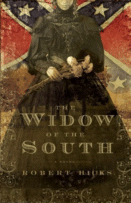The Origins of The Widow of the South
by Robert Hicks

|
Since 1987, I've been involved with Historic Carnton Plantation, a house museum now in my hometown of Franklin, Tennessee, a bit south of Nashville. As we began the task of restoring Carnton to its mid-19th Century magnificence, one of our most pressing questions was why one of the largest privately owned military cemeteries in the U.S. lay spread out on two acres of Carnation's backyard. We had stories -- some contradictory -- of how and why the cemetery had gotten there, but no one could explain the role the McGavocks played, or why the cemetery was on their property in the first place.
Around the time we were seriously beginning a state-of-the-art restoration of Carnton's house and grounds, descendants of the McGavock family, who had moved out of Carnton in 1911 and had lived in the same house in Franklin ever since, opened up their family archives to us. Most all of what remained of Carrie and John McGavock had been packed into two unused, unfinished, second-floor bedrooms. For four or five generations, bare, unfinished walls looked down on everything from paintings and furniture to boxes and trunks and clothing – to scrapbooks and piles of miscellaneous papers.
I started to read.
There were no diaries or letters in those rooms, but the scrapbooks and papers began to suggest some answers, even while I found myself asking more questions. I found obituaries from all over the country about Carrie McGavock, a woman who had lived a somewhat secluded life on her farm on the then-edge Franklin: she didn't travel, didn't host large parties of prominent folk, and yet she was remembered. Remembered not just by her immediate family, but a nation.
The obituaries clearly linked Carrie to the creation and maintenance of the Cemetery, but no journals or diaries were left to explain her motivation -- so, in the end, I felt that I had to sit down and explain, for myself, why she did what she did.
This novel is the result of those late-night broodings.
In the meantime, we've carried out a state-of-the-art restoration of the house and grounds. Carnton, now restored to its pre-Civil War splendor, is a thriving museum and living testament to Carrie's perseverance. We did it all without the typical funds to make such a restoration possible (public funding, grants, endowments, patronage of a patriotic organization, private or business foundation money, and so forth), but we did have her story: this incredible story of sacrifice and service.
 **Robert Hicks, the author of Widow of the South, was born and raised in South
Florida. In 1974 he moved to Williamson County, Tennessee; in 1979 he moved to 'Labor in vani," a late-eighteenth-century log cabin near Leiper's Fork, Tennessee. Working both as a music publisher and in artist management both in country and rock
music, Hicks's interests remained broad and varied.
**Robert Hicks, the author of Widow of the South, was born and raised in South
Florida. In 1974 he moved to Williamson County, Tennessee; in 1979 he moved to 'Labor in vani," a late-eighteenth-century log cabin near Leiper's Fork, Tennessee. Working both as a music publisher and in artist management both in country and rock
music, Hicks's interests remained broad and varied.
A lifelong collector, he was the first Tennessean to be listed among Arts &
Antiques's Top 100 Collectors in America. He served as co-curator (with Ben Caldwell
and Mark Scala) on the exhibition, Art of Tennessee, at the Frist Center for the
Visual Arts in Nashville. He was co-editor of the
exhibition's award-winning catalog, Art of Tennessee (UT Press, September 2003).
In the field of historic preservation, he has served on the Boards of Historic
Carnto Plantation, the Tennessee State Museum, The Williamson
County Historical Society, and the Museum of Early Southern Decorative Arts.
For the past two years, he has headed up Franklin's Charge: A Vision and Campaign for the Preservation of Historic Open Space in the fight to secure and preserve both battlefield and other historic open space in Williamson County.
The Widow of the South was born out of Hicks's many years of work at Carnton and his passion for the preservation of the remaining fragments of the battlefield. In writing the novel, his hope was to bring national attention back to this moment
in our nation's history, the impact those five bloody hours played in making us a
nation, and in the preservation of the sites tied to the story.
Return to the October 2005 issue of The IWJ.
